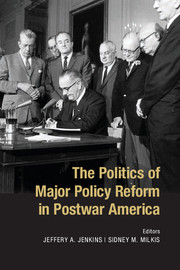Book contents
- Frontmatter
- Contents
- Contributors
- Acknowledgments
- 1 Introduction
- 2 The Long 1950s as a Policy Era
- 3 Regulation, Litigation, and Reform
- 4 Courts and Agencies in the American Civil Rights State
- 5 The Politics of Labor Policy Reform
- 6 Teachers Unions and American Education Reform
- 7 Progressive Federalism and the Contested Implementation of Obama’s Health Reform
- 8 Federalism and the Politics of Immigration Reform
- 9 Trade Politics and Reform
- 10 The Politics of Intelligence Reform
- 11 Follow the Leader
- 12 Conclusion: Madison Upside Down
- Index
- References
7 - Progressive Federalism and the Contested Implementation of Obama’s Health Reform
Published online by Cambridge University Press: 05 November 2014
- Frontmatter
- Contents
- Contributors
- Acknowledgments
- 1 Introduction
- 2 The Long 1950s as a Policy Era
- 3 Regulation, Litigation, and Reform
- 4 Courts and Agencies in the American Civil Rights State
- 5 The Politics of Labor Policy Reform
- 6 Teachers Unions and American Education Reform
- 7 Progressive Federalism and the Contested Implementation of Obama’s Health Reform
- 8 Federalism and the Politics of Immigration Reform
- 9 Trade Politics and Reform
- 10 The Politics of Intelligence Reform
- 11 Follow the Leader
- 12 Conclusion: Madison Upside Down
- Index
- References
Summary
At a celebratory ceremony held in the East Room of the White House on March 23, 2010, President Barack Obama signed into law the Patient Protection and Affordable Care Act of 2010 – potentially a landmark in U. S. social provision comparable to the Social Security Act, Civil Rights Act, and enactment of Medicare and Medicaid. “Potentially a landmark” was, however, the right way to think of the reform when first signed into law. This comprehensive measure promised to regulate private health insurance and extend affordable coverage to more than 30 million Americans, mostly people with low or lower-middle incomes. But these reforms would not be fully implemented until 2014–2019, and the law had to run perilous legal and partisan gauntlets first. The presidential signing ceremony came at the end of fifteen contentious months of partisan and interest group maneuvering in Congress, and launched the fledgling law into new rounds of legal challenges, plus efforts by conservative Republicans to win sufficient leverage in the November 2012 elections to repeal or eviscerate health reform before its major provisions went into full effect.
To the surprise of some, the Affordable Care Act survived the early death threats. The Supreme Court upheld its core provisions on June 28, 2012, and President Barack Obama was reelected on November 6, 2012, reinstalled in Washington, DC, along with a strong majority of Democratic Senators. Although Republicans determined to frustrate the implementation of Affordable Care at every turn remain in charge of the House of Representatives, the legal framework and much of the programmed funding for comprehensive health reform are here to stay. Led by the capable and savvy Secretary Kathleen Sebelius, Obama’s Department of Health and Human Services (DHHS) continues to work out regulatory details in negotiations with major interest groups, while much of the administrative and political drama shifts to the fifty U. S. states, which will have a lot to say about the implementation and success of reforms in coming years.
- Type
- Chapter
- Information
- The Politics of Major Policy Reform in Postwar America , pp. 157 - 178Publisher: Cambridge University PressPrint publication year: 2014
References
- 1
- Cited by



